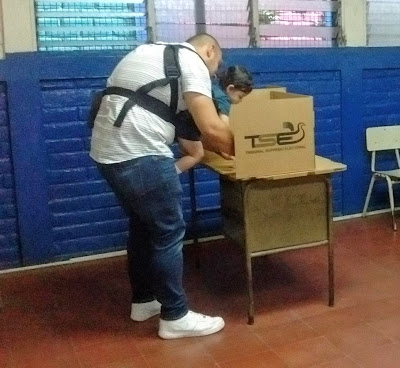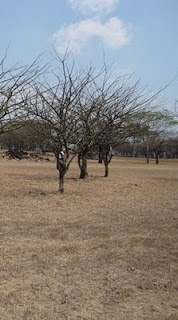Observations from the 2019 Presidential Election
It was an honor to serve as an international observer for the 2019 presidential election in El Salvador, as part of a national and international team coordinated by FECLAI - the organization of historic protestant churches in Central America. More than 2000 international observers volunteered to serve in the recent election. They came from across the globe, from churches, from non-governmental organizations and from embassies (including the US Embassy in El Salvador). Observers are trained and credentialed. Observers are awarded access to all phases of the election process, and are present in voting centers across the country on election day.
Observing is about presence. Observers do not intervene or correct. Observers do watch, take notes, photograph and file formal reports.
The election process in El Salvador is transparent and very different from that in the United States. It is "old school" and it works. A year ago, I wrote a variety of stories about the details of the election process, including:
The Voting Experience
Cardboard and Tape
Crayons and Paper
On February 3, 2019, Nayib Bukele was elected to be the next president of El Salvador. You can find a variety of analytical stories about Bukele's victory and what it means for the political parties in El Salvador at the blog site El Salvador Perspectives.
On February 3, 2019, I spent the day with a young Salvadoran law student, observing the voting process at 3 schools in the metropolitan San Salvador region. We noted every minute detail of the election process and from our perspective noted that the process was fair and transparent. Over the course of the day, we developed short-term friendships with all of the other actors in the voting process, from police officers to party observers to other national and international observers at our sites. Everyone was very professional and helpful.
It's hard to capture (or even remember) such a long day of small moments, but hopefully I can share a few photos on a couple of themes that will give you a sense of what El Salvador Election Day 2019 was like for a sampling of voters and observers.
Children
Many families have the tradition of voting together. Two and three generations of family members meet up at the voting site (if they all live within the boundaries of that site), celebrating their right and responsibility to vote. Little children learn about the process from their parents, some with more interest than others, with the lucky ones getting a chance to help mom or dad put the ballot into the ballot box. One little boy tried to peek at his mom's ballot while she voted. "No, no," she chided, "It's a secret ballot. It is not permitted for you to look." She then sent a nod and a wink my way as if to say, "See, I know the rules."
 |
| No secret ballot for this daddy. |
 |
| Mom's little helper |
Accessibility is a tricky thing in El Salvador. If you can navigate the crumbly sidewalks and open holes outside of the polling site, you have a good chance of finding the inside situation fairly navigable.
 |
| We heard that many sites had wheel chairs and helpers. In this site, political party youth were ready to lend a hand. |
 |
| We were told that last year people complained that the ramp was too steep. This year they built this new ramp. The school is on two levels, so surely the students will benefit as well as the voters. |
Located a prescribed distance away from the voting site entrances, political parties set up information centers or tents. The primary function of these centers is to assist the voter in finding the number of his or her assigned voting table within the voting site. This information is available online, but many Salvadorans either have no online access or understanding of that system and have to find their table numbers by searching through the long voter lists which are posted outside of the voting sites. Each voting table has 600 assigned voters listed alphabetically. If, for example, there are 10 voting tables at a site, that means hunting through 10 lists of 600 to find your name. Traditionally, the service of providing information has been augmented at the information tents with a bit of political bling to help ramp up enthusiasm for the political parties.
 |
| Voter list challenges: Reading the lists to find voter tables is not an easy task with tiny print in the bright sun. |
 |
| No pupusas or coffee here - just bumping music and computers. ARENA's info tent. |
 |
| At this spot, Bukele's team deposited a load of juice, and it was sort of "help yourself" |




Comments
Post a Comment